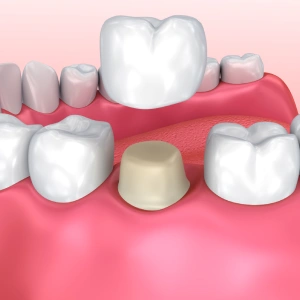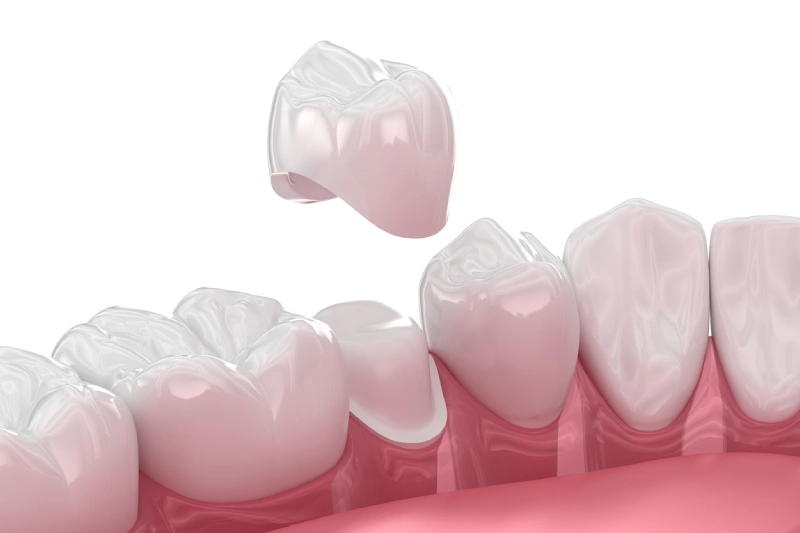Dental crowns, often referred to as “caps,” serve as versatile solutions for a variety of dental issues. From restoring damaged teeth to enhancing aesthetics, dental crowns play a significant role in modern dentistry. Understanding the purpose, types, and benefits of dental crowns is essential for anyone seeking to improve their oral health and smile.
Whether you’re considering dental crowns for restorative or cosmetic purposes, this guide will provide you with All about dental crowns to make informed decisions.
What is a Dental Crown?
A dental crown is a tooth-shaped cap utilized by the dentist to restore teeth that are weak, broken, or decayed. It fits over the entirety of the tooth, akin to a snug hat. Before bonding the new crown in place, the dentist removes a small amount of enamel to ensure a proper fit. These crowns are crafted by dental technicians using various materials, such as resin, metal, and porcelain.

When would you need a Dental Crown?
There are several situations in which you might require a dental crown:
- To strengthen a weak tooth.
- Protect and support a cracked tooth.
- Restore a worn-down or broken tooth.
- Secure a dental bridge in place.
- Conceal severe staining or discoloration on a tooth.
- Place a cap on a tooth that has had a root canal treatment.
- Cover a dental implant
Types of Dental Crown
There are various types of dental crowns, each with its own advantages and considerations:
Metal Crowns:
Dental technicians use metals like gold, palladium, nickel, and chromium to craft metal crowns. These crowns are durable, resistant to chipping or breaking, and require minimal enamel removal.
Porcelain-Fused-to-Metal (PFM) Crowns:
PFM crowns have the strength of metal with the natural appearance of porcelain. Dentists can match them to the shade of your natural teeth. PFM crowns may chip over time, and the metal underneath may become visible despite their durability. They are suitable for both front and back teeth.
Pressed Ceramic Crowns:
These crowns have a ceramic inner core, mimicking natural tooth enamel’s translucency. While durable, the layers of ceramic may chip away over time. They are used for both front and back teeth.
All-Ceramic or Porcelain Crowns:
These crowns closely resemble natural tooth enamel and are suitable for individuals with metal allergies. Zirconia crowns, a popular option, are extremely durable and gentle on opposing teeth, resulting in less enamel wear.
Same-Day Dental Crowns:
Created using CAD/CAM technology, these crowns are designed and crafted in the dentist’s office during a single visit. While convenient, not everyone is a candidate for same-day crowns.
All-Resin Crowns:
These crowns are more affordable but less durable than other types. They are prone to breakage and are commonly used as temporary crowns, lasting about three to five years on average.
What happens during a Dental Crown Procedure?
During a dental crown procedure, several steps are involved:
Consultation and Examination:
The dentist will assess the tooth and discuss the need for a dental crown. They may take X-rays to assess the extent of damage or decay.
Tooth Preparation:
Before placing the crown, the dentist will use local anesthesia to numb the tooth and its nearby area. Then, they will reshape the tooth by removing a small amount of enamel to make room for the crown.
Impression Taking:
The dentist takes the impressions of the tooth and the surrounding teeth. With the help of these impressions, the dental laboratory creates a custom crown that fits your tooth precisely.
Temporary Crown Placement (If Needed):
During the wait for the permanent crown, your dentist might fit a temporary one over the prepared tooth to safeguard it and preserve its look and function.
Crown Fabrication:
The skilled technicians make the permanent crown from the impressions. The dental crown is made of porcelain, metal, or a combination of both materials.
Permanent Crown Placement:
The dentist will replace the temporary crown (If any) with a permanent one using dental cement.
Final Adjustments:
After cementing the crown, the dentist will check for any necessary adjustments to ensure proper bite and alignment. They may also polish the crown to achieve a natural appearance.
Post-Procedure Care Instructions:
The dentist will give you guidelines on caring for your new crown, including maintaining proper oral hygiene and avoiding habits like chewing on hard objects that could damage it.
What are the Benefits of Dental Crowns?
Dental crowns offer several advantages, including:
- Dental crowns effectively treat worn, broken, or decayed teeth by covering and protecting them.
- They shield teeth from erosion and prevent further damage due to wear and tear, extending the lifespan of the natural tooth.
- Dental crowns enhance chewing function by providing a stable and durable surface for biting and chewing food.
- Crowns can enhance the look of teeth by restoring their shape, size, and color, resulting in a more aesthetically pleasing smile.
- With proper care, dental crowns can last between five and 15 years, providing a long-term solution for tooth restoration.
What are the Disadvantages of Dental Crowns?
Despite their benefits, dental crowns have some drawbacks, including:
- Dentists remove natural enamel, potentially weakening the tooth.
- Patients may experience sensitivity after placement, which often improves over time.
- Crowns can break, especially with force or wear.
- Ill-fitting crowns can trap bacteria and food particles, thereby increasing the risk of decay and gum disease.
- Individuals may experience an allergic reaction to the materials used in crowns.
- Crowns can be costly, especially with multiple or root canal procedures.
What Foods to Avoid with Dental Crown?
Here are some foods to avoid with a dental crown:
Hard Foods:
Avoid chewing on hard candies, nuts, ice cubes, popcorn kernels, and similar hard foods, as they can exert excessive pressure on the crown and cause it to crack or break.
Sticky or Chewy Foods:
Sticky candies, taffy, caramel, and chewing gum can adhere to the crown, pulling it off or damaging its seal.
Crunchy Foods:
Foods like hard taco shells, hard bread crusts, and crunchy vegetables like raw carrots or apples can also pose a risk to dental crowns.
Acidic Foods and Beverages:
Citrus fruits, tomatoes, vinegar-based dressings, and sodas should be avoided as they can erode the natural tooth’s enamel and the crown’s material over time.
Hard-to-Bite Foods:
Avoid biting directly into large, hard fruits like apples or pears. Instead, cut them into smaller, bite-sized pieces to reduce the risk of dislodging the crown.
Alcohol and Hard Liquor:
Excessive consumption of alcohol, particularly hard liquor, can weaken the adhesive bond of the crown and lead to loosening or dislodgement.
Chewing on Non-Food Items:
Avoid chewing on objects such as pencils, pens, or fingernails, as this can damage the crown or cause it to become loose.
Conclusion
These dental restorations offer several benefits, from strengthening weakened teeth to enhancing your smile’s aesthetics. At Abadin Dental in Coral Gables, FL, our team provides you with comprehensive dental care, including the expert placement of dental crowns. Whether you seek to address a dental issue or enhance your smile’s appearance, we are here to assist you every step of the way.
Ready to learn about dental crowns or explore your treatment options? New patients can call us at (305) 783-3750, while all other callers can reach us at (305) 446-1584. Schedule your appointment today and start the journey to optimal dental health and a radiant smile.
FAQ
How long do dental crowns last?
Dental crowns can last between five and 15 years with proper care. Regular dental check-ups and good dental hygiene practices can help prolong the lifespan of your crowns.
Are dental crowns painful to get?
The process of getting a dental crown is typically not painful. Your dentist will provide local anesthesia to numb the area before preparing the tooth and placing the crown.
Can dental crowns be whitened?
Dental crowns cannot be whitened using traditional teeth whitening methods. However, you can discuss options for improving the color of your crowns with your dentist, such as replacing them with new ones or considering other cosmetic dental procedures.


